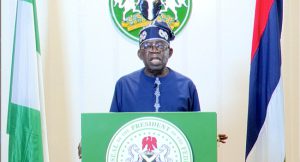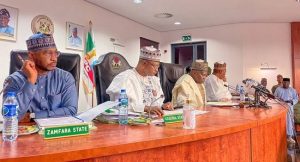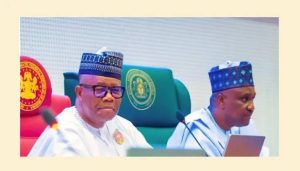By Adesuwa Tsan
The National Assembly is set to pass the Tax Reforms Bills transmitted by the legislature by President Bola Tinubu for consideration and passage. They are primarily aimed at changing laws that apply to tax collection, administration and simplifying the process
The bills are – A Bill for an Act to repeal certain laws on taxation and repeal the legal frameworks relating to taxation and enactment Nigeria Tax Act to provide for taxation of Income, transactions and other instruments, and for related matters;
A Bill for an Act to provide for the assessment, collection of, and accounting for revenue accruing to the Federation, Federal, State and Local Governments, prescribe the powers and functions of tax authorities and for related matters;
A Bill for an Act to repeal the Federal Inland Revenue Service (Establishment) Act and enact the Nigeria Revenue Service (Establishment) Act to establish the Nigeria Revenue Service, charged with powers of assessment, collection of, and accounting for revenue accruable to the government of the Federal Republic of Nigeria, and related matters;
A Bill for an Act to establish the Joint Revenue Board, the Tax Appeal Tribunal and the Office of the Tax Ombud, for the harmonisation, coordination and settlement of dispute arising from revenue administration in Nigeria and for related matters.
They were transmitted to the National Assembly on September 3, 2024, following the recommendations of the Presidential Committee on Fiscal and Tax Reforms, headed by Taiwo Oyedele, which was set up to review existing tax laws.
These proposed amendments ought to be generating commendations from the general public, as there have been complaints about the cumbersome taxation process in Nigeria. However, that is not the case. Instead, there is apprehension surrounding the proposed law, as many Nigerians worry that it may further worsen their financial woes by increasing the exorbitant cost of living in the country which went over the roof in the past year and half due to the harsh economic policies that the present administration introduced on assumption of office.

Interestingly, it is not only ‘ordinary Nigerians’ who are worried over the proposed bill. Governors and some traditional leaders, especially from the northern part of the country, have also been raising their voices in a foul cry against the amendment bill. On Monday, the Deputy spokesman for the House of Representatives, Hon. Philip Agbese (APC-Benue), said the state governors were so opposed to the passage of the bills that they have resorted to threatening to stop lawmakers’ return to the Green Chamber in 2027 if they approve the bills. To understand the proposals better, here is a breakdown of their intendment.
Firstly, they seek to provide a fiscal framework and clear and concise legal frameworks for all taxes in the country and reduce disputes in tax administration.
Secondly, they aim to repeal the Federal Inland Revenue Service Act and establish the Nigeria Revenue Service while creating a tax tribunal and tax ombudsman for resolution of issues that may arise from taxation.
Thirdly, they seek to increase revenue for the federal government and enhance services to Nigerians.

Breakdown of Tax Reform Bill
Also known as the Nigeria Tax Bill 2024, this proposal aims to reshape the country’s fiscal framework and establish a comprehensive legal framework for taxation. Some provisions in the bill are:
– Value-Added Tax (VAT) Increment: The bill proposes to increase VAT from 7.5% to 10% by 2025, with further increases to 12.5% from 2026 to 2029, and 15% from 2030 onwards.
– VAT Exemptions: Certain supplies will be exempt from VAT, including oil and gas exports, crude petroleum oil, feed gas, goods purchased for humanitarian projects, baby products, locally manufactured sanitary products, military hardware, arms, and ammunition supplied to security agencies.
– Company Tax: The bill outlines tax rates for companies, with small firms taxed at 0%, and all other companies facing a tax rate of 27.5% in 2025, reducing to 25% from 2026.
– Development Levy: A 4% development levy will be imposed on the assessable profits of companies, excluding small and non-resident companies, to fund the Student Education Loan Fund.
– Excise Tax on Lottery and Gaming Income: A 5% excise duty will be imposed on revenue from lottery and gaming trade or business.
– Telecoms Tax: A 5% excise duty will be imposed on telecommunications services, including postpaid and prepaid services regulated by the Nigerian Communications Commission (NCC).

Controversies surrounding the bill
However, the bill has sparked controversy and protests among Nigerians. Many have decried the timing of the amendment, which will increase the cost of living for Nigerians. The proposed raise of VAT from 7.5% to 10% by 2025, with further increases to 12.5% from 2026 to 2029, and 15% from 2030 onwards will lead to increased prices of essential goods and services, further depleting poor Nigerians’ purchasing power.
This will translate to more economic equality and reduced access to basic services as more low-income households will no longer be able to afford healthcare, education, and other essential services. There is also concerns that poor Nigerians may bear a disproportionate burden of the tax. Some of the exempted items from VAT, such as basic food items, locally manufactured sanitary towels, and tuition fees, may provide some relief to poor Nigerians.

Some stakeholders also protested that the bill was drafted without adequate public consultation. This group includes northern governors in Nigeria are opposing tax reforms bill, specifically the new derivation-based model for Value-Added Tax (VAT) distribution. They believe this model will unfairly affect their region, as many of the products produced there are VAT-exempt or consumed in other states.
The governors, along with traditional rulers from the North, met in Kaduna to discuss the issue and resolved the proposed VAT distribution model, which is based on where the tax is remitted rather than where goods and services are supplied or consumed, will lead to inequity.
In response to their concerns, the Chairman of the Presidential Fiscal Policy and Tax Reforms Committee, Mr. Taiwo Oyedele, has assured them that there is nothing to fear in the proposals as they are in the best interest of Nigeria, especially states and local governments.
The presidency argued that the reforms aim to create a fairer system, streamline tax administration, and eliminate multiple taxation, adding that the proposed laws also seek to consolidate various taxes into a unified structure, reducing administrative fragmentation.

It assured that the reforms will not increase taxes, lead to job losses, or absorb existing departments’ duties. Instead, they aim to stimulate economic growth, simplify tax obligations, and enhance revenue collection.
Similarly, the Speaker of the House of Representatives, Hon. Abbas Tajudeen, assured that the House would consider the Tax Reform “thoughtfully” and in the best interest of Nigerians.
See Tax Reform Bill, 2024 here



























































